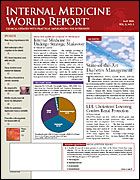Publication
Article
Internal Medicine World Report
To Use or Not to Use Melatonin?
Author(s):
BMJ
A meta-analysis of studies evaluating the use of melatonin for patients with sleep disorders concludes that this hormone secreted by the pineal gland that has been linked to circadian rhythm is safe to use in the short-term (3 months), but it may not be very effective (. 2006;332:385-393).
Investigators from the University of Alberta, Canada, supported by a grant from the US National Center for Complementary and Alternative Medicine, reviewed the literature on melatonin use in secondary sleep disorders, namely, those associated with medical, neurologic, or substance misuse, and sleep disorders resulting from sleep restriction, such as air travel or shift work.
In all the studies included in this meta-analysis, melatonin was compared with placebo in ≥1 of the following categories: time between lying down and actual sleep (sleep-onset latency), sleep efficiency, sleep quality, wakefulness after sleep onset, total sleep time, and rapid eye movement (REM) sleep.
In the secondary sleep disorders category, the 6 trials that had a primary efficacy outcome measure of sleep-onset latency had a combined estimate that favored melatonin but not to a statistically significant degree.
In the sleep efficiency category, 6 trials showed a significant effect favoring melatonin, but it was not clinically significant and translated into only 10 additional minutes of sleep time. In the safety analysis of 164 patients with secondary sleep disorders, adverse events were similar whether they were treated with melatonin or placebo.
In the sleep restriction category, results for sleep-onset latency again favored melatonin but did not achieve significance. There were no differences in sleep efficiency compared with placebo. In the 10 studies involving 487 patients who were included in the safety analysis, side effects were comparable in the 2 groups.
This review found "no evidence that melatonin is effective in treating secondary sleep disorders or sleep disorders accompanying sleep restriction," lead author Nina Buscemi, PhD, of the University of Alberta Evidence-based Practice Center, Edmonton, Alberta, Canada, and colleagues wrote.
Thus, the question of whether or not to use melatonin is left largely unanswered. Certainly more studies are needed to determine its efficacy in both secondary and sleep restriction sleep disorders. What is clear is that melatonin is safe to use, at least in the short-term.






